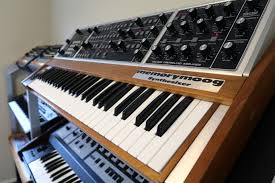
In the early 1990s, when I was living and playing in New York City, indie bands across the country, such as Polvo, Rodan, The Lapse, Codeine and many more, shared a sound that, drawing on predecessors like Slint, Sonic Youth and Fugazi, was almost fundamentalistically guitar-based. In the last couple of years I’ve been struck by the emergence of a new North American sound that, though seemingly coming from a similar musical world, puts a strong emphasis on keyboards, or more precisely, on the way synths and electronics interact with the classic guitar-bass-and-drums indie rock instrumentation. It is characterised by a rich sonic palate that incorporates noise, dissonance and an investigation of sound as an element in and of itself, creating a soundscape of great density that bases its obstructiveness on frequent and almost excessive repetition and on the interference of clusters, surges and drones; and it does all this to a great extent through the use of keyboards.
The 2018 album Room Inside the World by the Montreal-based band Ought reminds me of something Lee Ranaldo has said about Sonic Youth growing out of the heady underground artistic scene of early-80s New York City: that the band saw themselves as artists who simply happened to draw and paint and sculpt with guitars. Here this artistic no-wave exploratory and expressive role is assigned to the keyboard player Matt May. Over Tim Keen and Ben Stidworthy’s charismatic, anchoring and propulsive rhythm section and Tim Darcy’s affecting, elastic vocals and jittery guitars, May splashes, daubs and sprays layers of organic, unwieldy and evolving sounds. Ought’s songs have always brought to mind a varied ancestry, ranging from Throwing Muses to Pavement to Jeff Buckley to Taking Heads: percussive, meandering, melodic, unhinged, wistful, wry, heartfelt, smart… On this exceptional album they worked with the recording engineer and producer Nicolas Vernhes (whom in those aforementioned early ’90s I had the privilege of playing in a band with), who seems to have enhanced their already audacious tendencies: the arrangements achieve an almost orchestral scope, often slipping into spectacular inflorescences redolent of free jazz and the contemporary avant-garde.
When The Hecks started playing in Chicago in 2012, they were a duo consisting of singer-guitarist Andy Mosiman and drummer Zack Hebert. Their debut album was an intriguing if ragged piece of wilful disregard for conventional pop structures and strident sounds. Then they added two more members – their producer, Dave Vettraino, on guitar, and Jeff Graupner on synth – and grew into something a lot more convincing and special. Their extraordinary second album My Star, released last fall, sounds as if it was made up of samples taken from 1980s synth-pop in all its guises – from the dark and techie to the accomplished and emotive to the funny-haired and naff – along with bits taken from classic funk tunes and 10cc-type 70s rock. The constituent elements were then taken apart and chopped, and then reassembled the wrong way round or repeated mulishly to create odd songs with unlikely structures and textures. The result sounds strangely both minimalist and maximalist, analytical and playful; in its unaffected inventiveness, foraging wisdom, technical savvy and sheer beauty, it reminds me of Portishead’s Three. Like an album of unsolicited remixes of songs that never existed, My Star has a visionary, maverick charm.
Probably the most well-known exponents of this sound are Calgary’s Preoccupations. Their latest album, New Material from 2018, ramps it up to an aural assault of Industrial proportions. The main function of the synths seems to be pumping up the tension, which they do through an ever-intensifying array of pounding drum triggers and reverb-soaked pads. Even the more poppy moments feel overpopulated, affording no respite, no air, until clusters turn into claustrum. The album burns with a sense of emergency, raging against the overloading of everything: information, pollution, radiation, lies. Like an airplane sneaking up on you from behind as its deafening noise builds up to an unbearable level, it’s pretty much the exact opposite of our current world of empty streets, silenced cities and vacated airways.